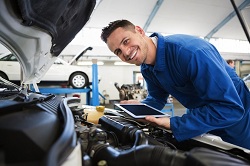When searching for your next used car, don’t forget to consider how many owners it’s had. Those that have been owned only once tend to be in better condition and worth more compared to those with multiple owners. You can also expect to see less wear and tear, less mileage, and less years on them! 80% of shoppers prefer to purchase one-owners over other used cars too! Sounds pretty great so far; what’s the catch right? You guessed it, the more reliable the car, the more it will usually cost. But before you make your decision based on price alone consider all those benefits. Also, it may not cost a lot more, only slightly more. According to Carfax most one-owner purchases are less likely to need expensive repairs and are more reliable. However, finding a good deal on a one-owner begins the same as any other used car purchase… homework. Just because it’s a one-owner doesn’t mean its owner was honest Abe. Here’s a few items for your “ask the seller” checklist. Remember to get the full story before considering purchasing a one-owner or any other used car.
- Was it used for business or personal use? Depending on the kind of business this may tell you if the car has mainly highway or in-town miles. Road miles are preferred.
- Where was the car registered? Road salt can be a huge problem if the car was from the northern states (Maryland, New Jersey, New York, Boston etc.).
- How many estimated miles per year was it driven? If it’s been sitting for a long period of time there are a variety of problems you should look out for. Check the battery and around it for leakage. Hoses and other componentry including belts that are vulnerable to “natural decomposer” should also be checked. A full fuel system flush should also be undertaken to clean out “bad fuel that can gum up and clog the injectors,” Probably get a full replacement of air, oil and cabin filters, engine oil and coolant.
- Was it ever involved in an accident, fire, or flood? Extensive damage such as foam absorber or metal reinforcement bar damaged. If it’s an SUV hit by a small car there could be floor damage if the car slid under it. Mold, rust or smoke damage, could be lurking behind metal, inside the upholstery and car’s frame.
- What reasons did the previous owner have for selling? This could be HUGE RED FLAG or just a case of personal preference, which makes this a great deal for you!
Informed, reliable dealers will gladly provide these answers in hopes of proving the automobiles worth. Remember to ask for a Carfax if the dealer has not offered one. As I’ve said before, this is invaluable when it comes to confirming background information on any used car, truck, or SUV. If the dealer can’t or won’t provide a Carfax, keep looking.
Sources
- Weathers, Cliff. What damage should I look into if I was rear-ended but there is no visible damage? Yahoo Answers. Yahoo Answers, sourced from: https://answers.yahoo.com/question/index?qid=20090814090903AA6kApK
- Howie, Craig. Cars parked too long can develop problems. CNN. cnn, 1 April. Web 2009 April. 2016
Posted 04/08/2016 in TM AUTO UPDATE
Used Vehicles, Used Car, Used Cars, Used Trucks, Dependable Cars, Pre owned cars, Used SUV,




